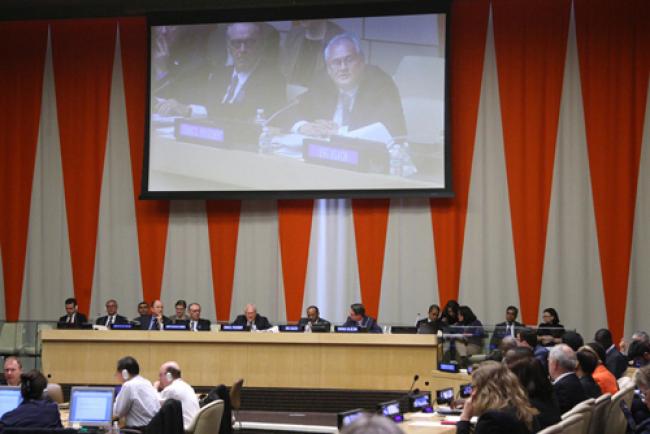“Placing our world on a sustainable path needs to be infused with a new global partnership for development. This partnership must be based on equity, cooperation and accountability. It must aim for transformative change,” Eliasson said, opening the Economic and Social Council’s annual Spring Meeting with the Bretton Woods institutions and UN agencies.
Along with ECOSOC President Martin Sajdik, the meeting featured presentations by high-level officials from the World Bank, the International Monetary Fund (IMF), the World Trade Organization (WTO) and the UN Conference on Trade and Development (UNCTAD).
Delivering remarks on behalf of the Secretary-General, Eliasson said that in the wake of the 2009 crisis growth remains insufficient and the employment situation is dire in many countries. Inequalities are growing. The world’s wealthiest 85 people have as much wealth as the poorest half of our planet’s population.
While this year marks the 70th anniversary of the Bretton Woods institutions and the 50th anniversary of UNCTAD, the world continues to wrestle with many of the challenges they were set up to address, he noted.
“Bold leadership is indeed needed for strengthened multilateralism,” he said of the major development financing bodies, adding that macro-economic policies must focus on a strong, balanced and sustainable recovery, with particular emphasis on jobs.
“Our task ahead is two-fold. We must ensure that hard-won development gains are preserved…and as we now look beyond the Millennium Development Goals (MDGs), our agenda for post-2015 should be ambitious, inclusive and focused on the concrete challenges for us and for future generations, as well as on strong institutions to meet these challenges.”
Eliasson said the role of ECOSOC and the organizations represented at the Meeting is crucial. “You can channel financing for critical long-term investments, such as infrastructure. You have the capacity to act counter-cyclically, contributing to greater stability in the financial system,” he said, adding: “Your institutions can wield vast influence in the success of the climate and post-2015 development agendas.”
Echoing that sentiment, Sajdik said the success of the new development agenda depends on a strong global economy. Achieving a stable and equitable economic growth will in turn require greater cooperation and coherence in macroeconomic policies.
This is why “Coherence, coordination and cooperation in the context of financing for sustainable development and the post-2015 development agenda” was chosen as the theme of this year’s two-day Meeting.
“The post-2015 development agenda will require a comprehensive financing framework that ensures the mobilization of financial resources and their effective use for sustainable development,” he said, adding: “We need a comprehensive strategy that incorporates all forms of financing, including public and private, domestic and international.”
Also addressing the Meeting, Jorge Familiar Calderon, Acting Executive Secretary of the World Bank Development Committee, reported on the body’s annual session last week in Washington, D.C., where, he said, the Committee’s Governors recognized that policy adjustments and appropriate coordination and communication will be required to fostering strong, inclusive and sustainable growth in Monday's interconnected global economy.
As such, the Committee encouraged the World Bank Group (WBG) and the IMF to work jointly and with all member countries in pursuing sound and responsive economic policies; addressing underlying macroeconomic vulnerabilities; rebuilding macroeconomic buffers; and strengthening prudential management of the financial system.
ECOSOC High-level Meeting with World Bank, IMF, WTO and UNCTAD. UN Photo/Devra Berkowitz
